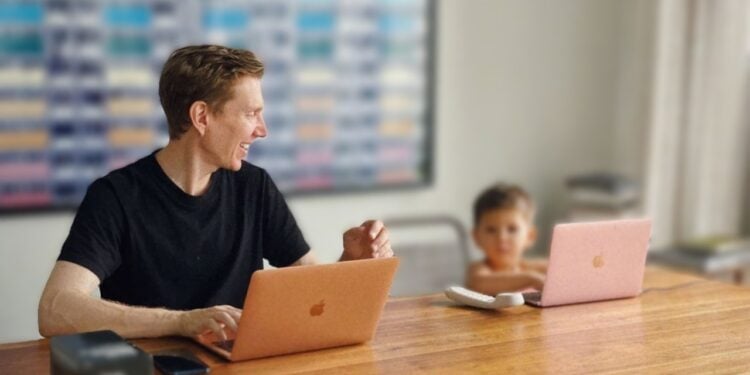- On the latest Allwork.Space Future of Work podcast episode, Daan van Rossum discussed the transformation of work with hybrid and remote models.
- Trust and intentional culture building are key to managing remote teams, with technology playing a pivotal role in transitioning companies to these models.
- AI advancements offer opportunities to reduce digital overload, improve workflows, and prompt consideration of purpose and identity beyond traditional work roles.
We’ve come a long way from the days of typewriters and carbon copies. Technology has revolutionized how we work, enabling new models like hybrid and remote that offer more flexibility and autonomy. But how do these new approaches really compare? What are the benefits and drawbacks for companies and employees?
Let’s start with some definitions. Hybrid work blends working partly from home and partly from a central office, and fully remote means working entirely from outside a central office, typically from home. Both models offer pros and cons depending on your priorities and role.
On the last episode of the Allwork.Space Future of Work podcast, Daan van Rossum, CEO of FlexOS and a leading expert in the field of hybrid and remote work shared his insights.FlexOS raised 1 million dollars in 2022 and is touted as the leader of hybrid and remote work and one of the top 15 future of work brands.
In this episode, we discussed how remote and hybrid work models have come to the forefront in reshaping how professional engagements are conducted. Both approaches prioritize flexibility and the accommodation of personal preferences in work environments.
“If you want people to be productive and creative and collaborative, you want to give them the space to do that and let people choose, and give them that autonomy and agency to pick the place that works best for them to do the tasks that they have to do” Daan van Rossum said on the podcast.
“If you want people to be productive and creative and collaborative, you want to give them the space to do that and let people choose, and give them that autonomy and agency to pick the place that works best for them to do the tasks that they have to do,” van Rossum said on the podcast.
Studies show productivity and collaboration often improve with hybrid and remote work. Employees gain flexibility to integrate personal and professional needs, while avoiding stressful commutes. Managers, however, must be more intentional about designing collaborative work sessions and fostering culture remotely. It requires a foundation of trust for employees to succeed working independently.
“If you don’t have those moments in the office where you kind of have a sense for how things are going (because you can see people either really energized or kind of demotivated), listening/surveying becomes a much bigger thing, and then also measuring and building that stronger culture,” he said. “Those are the new fundamentals that every company will have to put in place, and I think that’s what companies are transitioning to now. And obviously, a lot of it is fueled by technology as everything with hybrid.”
Artificial intelligence promises to further enhance workflows. AI agents can help unburden us from routine tasks, freeing us up for higher-level creative work. But they also risk disrupting industries in the longer term as the technology advances.
“OpenAI just came out with Sora, and so we see kind of now evolutions in AI that are so much more — the velocity is so much higher than what people ever could have expected,” van Rossum said.
Rather than a threat, AI offers new opportunities to tailor our work lives around what motivates us: financial success may come from pursuing our passions versus just chasing a paycheck, and being productive may involve contributing value across a portfolio of projects rather than a single job.
“I like to focus more on the shorter term, which is really where AI can be that great assistant to really unburden us of this huge digital overload, which obviously we have created for ourselves, because every time we think we invent something to make life easier and to make work easier, we just create more work for ourselves,” van Rossum said.
The way we get work done will surely continue to evolve. But by embracing change, prioritizing flexibility and purpose, and leveraging tools like AI to our benefit, we can transform work into a source of creativity rather than drudgery.
“In Europe, people can already compress their work into a four-day workweek. And it wouldn’t really be that difficult to see how you can move to a three day work week, and then shorter and shorter and shorter, because the moment you can imagine it, you can give an AI agent the task to do it,” van Rossum explained.
As this tech advances, workers may need to expand their identities beyond traditional notions of career-oriented work.
“I think as people realize that AI can do a lot of what we do, there will be that sort of question of, who am I outside of work? Like, what am I passionate about?” he said. “If I had more time in the week, what would I do? Who am I, uniquely, as a human being? And I think we’ll see a lot more of that finding of purpose and identity outside of work.”



 Dr. Gleb Tsipursky – The Office Whisperer
Dr. Gleb Tsipursky – The Office Whisperer Nirit Cohen – WorkFutures
Nirit Cohen – WorkFutures Angela Howard – Culture Expert
Angela Howard – Culture Expert Drew Jones – Design & Innovation
Drew Jones – Design & Innovation Jonathan Price – CRE & Flex Expert
Jonathan Price – CRE & Flex Expert











